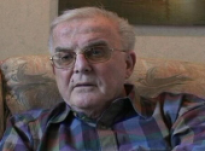Ben - Interview 02

More about me...
Ben describes what it was like immediately after his operation. He was able to raise his arms straight up very soon after his mastectomy.
Ben describes what it was like immediately after his operation. He was able to raise his arms straight up very soon after his mastectomy.
I was admitted into hospital and had the operation and from there I remember going down and them putting a needle in me and I thought I was going to, the usual thing, I was gonna be… count to three and you’ll be gone, and I said, “Have I got a…?” and I was gone. So I didn’t get to one, two or three, and so I went down and I remember waking up on the ward because I was first in, I had been told I was first in, I woke up and raised my head and had a look and I couldn’t see anybody else awake and there was a whole ward full of people that had been operated on that morning and eventually they came round and sort of dealt with me and helped me, and from there I was then taken back to this little small unit where there was I think four people in this little unit, and stayed in there and was… I’d been given two bags, bags for blood and residue, to be taken, and then my wife came in and sort of greeted my son and my wife and… I was able, even then I’d been told that the first thing ladies, or you should try and do is raise your arms and I was able to do that and there was ladies that couldn’t do it and I was able to raise my arms straight up straight away, so I kept doing that and then trying to do all the exercises that I’d been told to do at that particular time.
Ben's veins became like 'plastic straws' and he had disconcerting pains in his arms. He lost all his head and body hair.
Ben's veins became like 'plastic straws' and he had disconcerting pains in his arms. He lost all his head and body hair.
Ben thought he perhaps received better service as a 'lone soldier' amongst other female patients being treated for breast cancer.
Ben thought he perhaps received better service as a 'lone soldier' amongst other female patients being treated for breast cancer.
One of the things I’ve found recently is I’ve… because when I go to the clinic, the [cancer unit] is that they, there’s about 200 women there in the clinic and there’s me, and I get called and sort of, the first time we went, they thought it was my wife that was getting called in, and now of course they know me, that… that it’s me, so…
Ben realised that the information he had been given was geared to women and that he had to be careful about what he read into it.
Ben realised that the information he had been given was geared to women and that he had to be careful about what he read into it.
Ben would have liked to have gone to a support group but what he really wanted was the opportunity to meet other men with breast cancer.
Ben would have liked to have gone to a support group but what he really wanted was the opportunity to meet other men with breast cancer.
Now, I see at the back here there’s a breast cancer support group?
Ben thinks that the term male breast cancer helps to raise awareness.
Ben thinks that the term male breast cancer helps to raise awareness.
Quite a lot of the literature, when we’ve been looking at this, talks about male breast cancer, and we’ve come across this… some people we’ve been speaking to really don’t like that term. Do you have any opinions on that?

